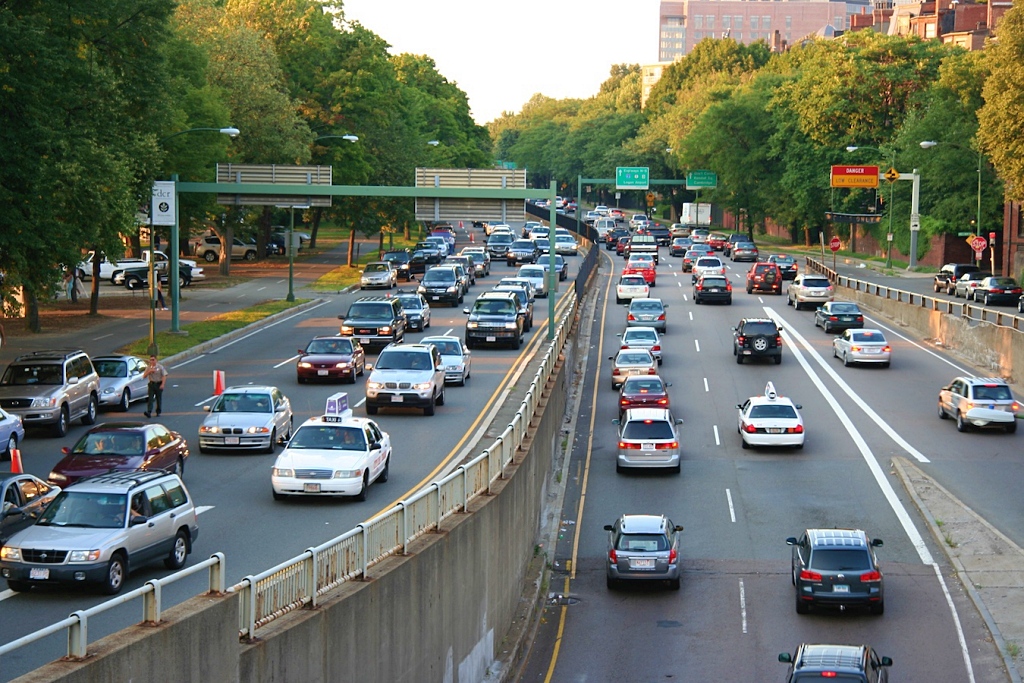New England by Car, Rental & Driving
Unlike the wide open spaces of the western United States and Canada, you will normally drive only an hour or two to your next destination in New England.

Driving US 6, the Mid-Cape Highway, Cape Cod MA.
Driving your own vehicle or a rental car around New England gives you the freedom to go anywhere, whenever you want. Driving is usually more time-efficient than using public transportation in a relatively compact region such as New England.
Distances
Here are some destinations from Boston MA and the time it takes to drive there:
1 Hour |
2 Hours |
3 Hours |
|---|---|---|
Manchester NH |
Brattleboro VT |
New Haven CT |
Plymouth MA |
Cape Cod MA |
|
Providence RI |
Hartford CT |
Bennington VT |
Portsmouth NH |
Mystic CT |
|
Sturbridge MA |
Portland ME |
|
|
|
|
| 4 Hours | 5 Hours | 6 Hours |
Castine ME |
Bar Harbor ME |
Montréal QC |
Mt Katahdin ME |
||
Burlington VT |
|
|
Speed Limits
On most two-lane roads the maximum speed limit is 55 miles per hour (mph; 89 kph). On four-lane Interstate and similar highways, speed limits vary from 55 mph (89 kph) to 70 mph (113 kph).
Traffic often moves at speeds several miles per hour above the legal limit. Although police patrols often ignore this, a driver exceeding the speed limit is always liable to be fined for exceeding the limit, even if every other car is exceeding it as well.
Speeding Control
Control of drivers' speed on highways is predominantly controlled by local and state police mobile patrols (officers in police patrol cars) and radar traps—officers concealed from view who monitor speeds with radar equipment and stop and fine drivers for exceeding speed limits.
Unmanned speed cameras are rare, although highway surveillance cameras on gantries and towers are common.
Fines can be substantial, several hundred dollars per incident.
Highway Tolls
There are few toll booths left in New England. Most toll-collection is electronic and automatic.
Cameras on gantries over the highway photograph your vehicle's license plate as you pass. If you don't have a toll transponder, a bill for the toll will be mailed to the registration address of the vehicle.
The E-ZPass electronic RFID transponder, placed on a vehicle windshield, communicates with toll-tracking transceivers at toll stations to record toll transactions. It is used throughout New England, New York, south to North Carolina and west to Illinois.
Each state has its own E-ZPass program. To use E-ZPass, you must register and purchase a transponder. Here's how to do it for Massachusetts.

Traffic on Storrow Drive in Boston.
Gasoline & Diesel Fuel
Unleaded gasoline (petrol) with (R+M)/2 octane ratings of 87 to 92 and perhaps 93, and clean diesel (ultra-low-sulfur diesel) motor fuels are easily found in New England, with plenty of fuel stations in cities, towns, villages and on highways. Prices vary from station to station and state to state because of prices set and state taxes levied. Diesel fuel is usually more expensive than gasoline.
Fuel dispensed is measured in US gallons. One US gallon = 3.78541 liters, or 0.832674 imperial (UK) gallon.
Most fuel stations have self-service fuel pumps: insert your credit or debit card into the pump, put the fuel hose nozzle into the fuel filler tube of your vehicle and pump your own. You can always pay in cash for your fuel if you prefer.
A small number of stations may have full service pumps at which an attendant will pump the fuel for you, usually for a slightly higher price. If you have trouble with fueling you can always ask an attendant for assistance, even at self-service pumps.
Electric Vehicle Charging
Here's information on charging from Energy New England. Use the PlugShare website or app to find charging stations.
Parking
In city centers, street parking is usually controlled by parking meters or parking ticket stations. Parking lots, though in some cases expensive, are the best option for longer (2+ hours) parking sessions.
At busy transportation termini such as airports, bus terminals, ferryboat docks, etc., parking can be strictly regulated. If, for example, you plan to drive to Hyannis MA, park your car and take a passenger ferryboat to Nantucket Island in the summertime, you should reserve both your place on the ferry and your parking space at or near the dock in Hyannis. You may not be able to find another legal parking space near the docks.
Car Rental/Hire
To rent/hire a car in New York or New England you must be 25 years of age, and have a valid driver's license from a US state or territory, Canada, Mexico, or most other countries.
Driving License
Non-US drivers do not need an International Driving Permit (IDP), though you may need to have a translation of your driver's license into English if it is not in English, and an IDP accomplishes that for you.
An IDP by itself, without a valid government-issued driver's license, is not sufficient to rent a car or to drive legally in the USA.
Credit Cards
Though a credit card is not required, it is almost a necessity. Without a credit card you must leave a sizable cash deposit, perhaps $100 per day for the estimated length of the rental, or perhaps a flat $2000 or more as security deposit.
Car Rental Rates
Rental rates vary among companies. The well-known international companies with car rental desks right in the major airports tend to be more expensive than the small local agencies, though standards of service vary among the small agencies. Moderate-sized agencies with airport shuttle buses to take you to their "off-airport" locations are often good bets: not as convenient, but perhaps cheaper.
Cheapest rates are for the smallest cars, rented on "weekends" (Thursday noon through Monday noon), or for an entire week or more with unlimited mileage, and returned to the place of rental, or at least to the city of rental. Check prices and availability here:
Fuel
Always return a rental car to the agency with as much gas in it as when the rental began (usually a full tank). Agencies will charge you if they must refuel the car, and most charge high prices at their pumps. Tip: when leaving the place of rental, make a note of fuel stations near it at which to fill up before returning the car.
Insurance
Among the high charges for car rental are those for insurance. The so-called Collision Damage Waiver or Loss Damage Waiver can cost from $14 to $22 or more per day.
If your own auto insurance covers damage to a rental car, you needn't waste money on CDW or LDW; check with your auto insurance agent to be sure. Otherwise, if you have a credit card with car rental insurance coverage, it may provide coverage for any rental car rented with the card. Check your credit card agreement to see what coverage is provided.
In Case of Damage to the Car...
In case of damage, rental car companies may require not only that you pay for repairs, but that you pay normal rental fees for all the time that the rental car is out of commission for repairs. These "loss-of-use" fees may be covered by your credit card or your own auto insurance—check to be sure.

